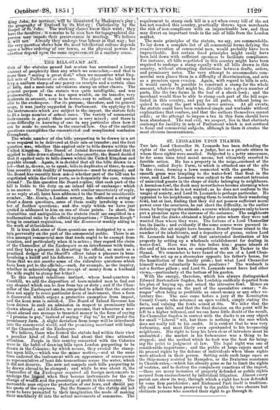ST. LEONARDS 1JPON THAMES.
THE late Lord Chancellor St. Leonards has been defending the rights of the subject, not as a judge, e, but as a private citizen in whom those rights were assailed. Su jected to a petty annoyance, he for some time tried moral means but ultinattely resorted to forcible action. He has a property in the neigee,ournood of the 'Thames, called Boyle. Farm, to which is attached one of the aits . in .the. river, .forming a; lawn connected with the garden. The . smooth gram was tempting to the water-fowl that float in the river, and Len' St. Leenards was subject to the constant intrusion of uninvited guests in the shape of ducks belonging to neighbours. A harmless fowl, the duck may. nevertheless become. alarming when he appears where he is not wanted; as he does not conform to the usages of society, and Lord St. Leonards is perhaps particular. He ;appealed to his neighbours, urging them to restrain their wandering fowl, but at last, finding. that they did not possess sufficient moral power over the creatures, he cut short the difficulty, in the earlier cases, by buying.up the animals; a course which appears only to have put a premium upon the increase of the nuisance. The neighbours found that the ducks obtained a higher price where they were not wanted than where they were. The fortune of a Lord Chanceller bas.its ; and evidently if thesame course were pursued in- definitely, thb ait might have become a Brandt Goose island in the number of its inhabitants, and a.depository of guano, unless Lord St. .Leonards had bought off that unintended destination of his property by setting up a wholesale establishment for dealing in water-fowl. Here was the fate before him: guano islands at the end of his own lawn, or. competition with- Mr. Tucker in the Strand. We remember to have heard of the son of a Lord Chan- cellor who set up as a shoemaker opposite his father's house, for the humiliation.of the family pride; but what Lord Chancellor himself would voluntarily become poulterer? The woolsack is not a feather pillow; and Lord St. Leonards must have had other views,—particularly at the bottom of his garden. - With the energy, therefore, which has always distinguished Edward Burtenshaw Sugden, his Lordship suddenly departed from his plan of buying up, and seized the intrusive fowl. Hence an action for damages on the part of the speculative owner; "da- mages" often being as profitable as smart-money or an other vo- luntary fine. The case came before a jury a the Kensington County Court; who returned an open verdict, simply stating the facts, and valuing the fowls seized at 30s. We infer that the present case falls, and that the final decision on the point will be left to a higher tribunal, and we can have little doubt of the result. Ex-Chancellor Sugden in contest with the ducks is an easy object for small "Liberal" wit, but there is nothing in the ease which does not really tell to his credit. It is evident that he was very forbearing, and most likely even openhanded to his trespassing neighbours. His right to keep his lawn clear of intruders must be undoubted; the market in his forbearance was a thing to be stopped; and the method which he took was the best for bring- ing the point to judgment at law. The legal right was one of considerable importance; and the public at large enjoys most of its present rights by the defence of individuals when those rights were attacked in their person. Setting aside such large cases as the Ship-money resisted by Hampden, or the Braintree resistance to Church-rates,--which has already gone so far to limit the rights of vestries, and to destroy the compulsory exactions of the impost, —there are many instances of property defended or public rights secured from encroachment by individual litigation. Almost every parish can show its way, through which a right has been defended bv some firm parishioner; and Richmond Park itself is tradition- ally said to have been preserved to the public by two obscure but obstinate persons who asserted their right to go through it.


























 Previous page
Previous page